Reporters' Memorable Stories
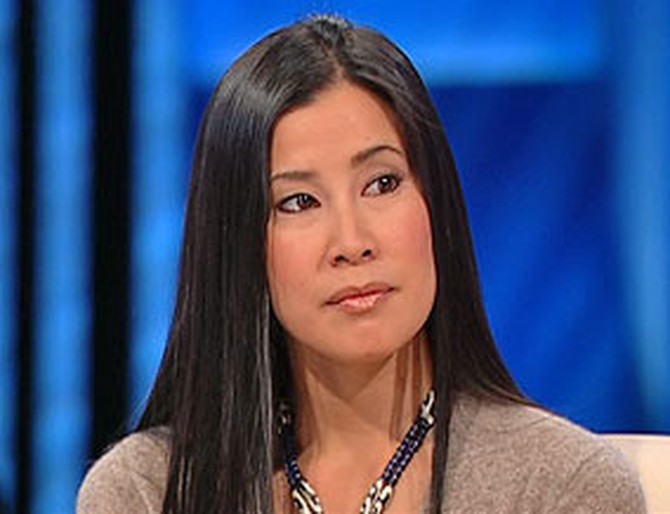
Journalist Lisa Ling has reported from danger zones all over the world, but this assignment nearly got her abducted and almost killed. She's penetrating the violent street gang MS-13.
MS-13 stands for "Mara Salvatrucha," a name Lisa says everyone needs to remember. Once a localized Los Angeles problem, the gang has grown into an international threat. Foot soldiers in the United States alone number over 10,000. The gang's brutality is rapidly spreading across 33 states, touching even rural and suburban areas.
MS-13 stands for "Mara Salvatrucha," a name Lisa says everyone needs to remember. Once a localized Los Angeles problem, the gang has grown into an international threat. Foot soldiers in the United States alone number over 10,000. The gang's brutality is rapidly spreading across 33 states, touching even rural and suburban areas.
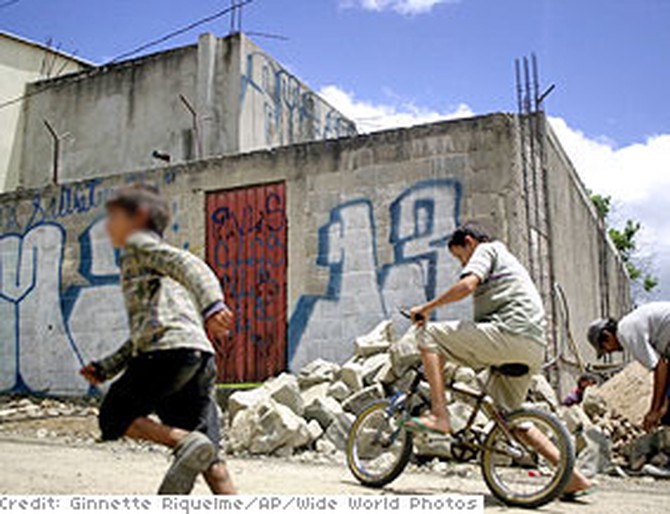
In Los Angeles, one active gang member agrees to talk candidly with Lisa. For the interview, he goes by the name "Jester." Jester is only 20 years old, but he's been a member of MS-13 since he was 8. Violence is the first step of MS-13, Lisa says—"gang-bangers" must always prove their toughness. In an initiation ritual called "jumping in," new members are beaten for 13 seconds.
Jester says he shot someone for the first time when he was just nine years old—the only time, he says, he ever felt scared. "Imagine this," Lisa says. "He's a little boy. He walks up to a group of six rival enemies and he's so scared that he starts firing his gun [with] his eyes closed. ... He opens his eyes and he sees that one of them has fallen. He [then walks] away to the getaway car, because MS members never run."
Since that first shooting, Jester says he has lost count of how many rival gang members he's shot—but he admits to Lisa that the number is more than 20.
Jester says he shot someone for the first time when he was just nine years old—the only time, he says, he ever felt scared. "Imagine this," Lisa says. "He's a little boy. He walks up to a group of six rival enemies and he's so scared that he starts firing his gun [with] his eyes closed. ... He opens his eyes and he sees that one of them has fallen. He [then walks] away to the getaway car, because MS members never run."
Since that first shooting, Jester says he has lost count of how many rival gang members he's shot—but he admits to Lisa that the number is more than 20.

For gangs, defending turf means more than bragging rights—every block they control earns income. Businesses working the street, such as hot dog vendors, are taxed protection fees. What if they don't pay? "They always pay," Jester says. "Sometimes you've got to get aggressive with them." Extortion seems to be one way MS makes money—drug trafficking is another. "Crystal, cocaine, heroin, rock, weed, pills," Jester says, "If you need any kind of pills, don't go to the doctor."
"If somebody tries to step in [our territory], we're going to take them down no matter what it takes," Jester says. "We'll shoot them."
Lisa says she asked several gang members if they feel remorse for the murders they commit. "They don't," Lisa says, "because 'it's either him or me.' It's a gang war out there. ... [Gang life leads] either to prison or to death. And they all know that."
Two weeks after Lisa's interview with Jester, he and a colleague were arrested for murder.
"If somebody tries to step in [our territory], we're going to take them down no matter what it takes," Jester says. "We'll shoot them."
Lisa says she asked several gang members if they feel remorse for the murders they commit. "They don't," Lisa says, "because 'it's either him or me.' It's a gang war out there. ... [Gang life leads] either to prison or to death. And they all know that."
Two weeks after Lisa's interview with Jester, he and a colleague were arrested for murder.

One of MS-13's most secure territories is a prison in El Salvador—where gang members call the shots. En route to the prison, Lisa and her crew received a call informing them that prisoners were planning to hold her hostage. The trip was cancelled, but days later Lisa returned to ask inmates about the kidnapping plot.
Prison officials told Lisa that they'd let her in—but she'd have to talk to the gang members inside to make sure they would let her out. After hours of negotiating with inmates, Lisa interviewed one man who insisted the stories about prisoners planning to harm her were only rumors—the proof, he points out, is the fact that she's "still breathing."
The inmates acknowledge they could easily kidnap her if they wanted to, but they deny that such a plan ever existed. "You have people around you [who] are never, never going to get out of jail, so they don't care [if they] do a stupid thing like that," an inmate says, "but it's not in our minds to do that."
Despite the threat of danger, Lisa says she felt a human connection with the inmates that eased her fears. "At the end of the day, no matter what they've done, they're human beings," she says. "When you sit across from them and you look them in the eyes, if you treat them with respect, they will respect you."
Prison officials told Lisa that they'd let her in—but she'd have to talk to the gang members inside to make sure they would let her out. After hours of negotiating with inmates, Lisa interviewed one man who insisted the stories about prisoners planning to harm her were only rumors—the proof, he points out, is the fact that she's "still breathing."
The inmates acknowledge they could easily kidnap her if they wanted to, but they deny that such a plan ever existed. "You have people around you [who] are never, never going to get out of jail, so they don't care [if they] do a stupid thing like that," an inmate says, "but it's not in our minds to do that."
Despite the threat of danger, Lisa says she felt a human connection with the inmates that eased her fears. "At the end of the day, no matter what they've done, they're human beings," she says. "When you sit across from them and you look them in the eyes, if you treat them with respect, they will respect you."

Lisa says that every American should be concerned about the rise of gang activity. Towns like Houston, Omaha and Seattle are now home to MS-13. The glamorization of gang culture—from popular music to tattoos and shaved heads—is a trend Lisa finds disturbing. "We need to educate young people so that they don't emulate these kinds of guys," she says. "It's no joke, the gangster lifestyle."
Some kids find the gang lifestyle so attractive they claim to be members, Lisa says. "The MS members say to them, 'You think you're MS? Well, here's a gun—you go take this guy out. And if you don't do it, then you're going to pay the consequences for it.' It's blood in, blood out."
Some kids find the gang lifestyle so attractive they claim to be members, Lisa says. "The MS members say to them, 'You think you're MS? Well, here's a gun—you go take this guy out. And if you don't do it, then you're going to pay the consequences for it.' It's blood in, blood out."
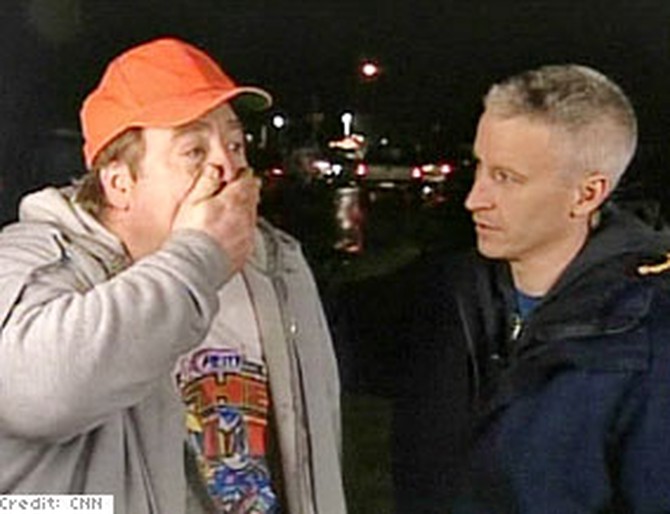
Viewers have come to expect truly special reports from CNN's Anderson Cooper, host of Anderson Cooper 360°. Recently he was in a situation where he was not just reporting the news, but his reporting actually became part of the story.
At around noon on January 2, 2006, the first reports hit the airwaves: part of the Sago mine in Tallmansville, West Virginia, had exploded and collapsed. The 13 miners inside were trapped. Over the next couple of days, the situation was marked by round-the-clock news coverage outside the tiny Sago Baptist Church.
Around midnight, mining officials told the families that their loved ones had been saved. News outlets across the globe reported the miracle that deserved its banner headlines: 12 of the 13 survived, had been rescued and were on their way to Sago Baptist Church!
As family members celebrated, mining officials were quickly learning the truth. At around 2:30 a.m. on January 4—three hours after the initial reports of a dozen survivors—Anderson spoke with bystander Lynette Roby, who had overheard mining officials talking to the families. In a horrible reversal, officials reported that 12 miners were dead, and the only survivor was in a coma.
Anderson recalls that Roby walked "out of the dark and said, 'They're all dead.' It was like a punch in the stomach."
At around noon on January 2, 2006, the first reports hit the airwaves: part of the Sago mine in Tallmansville, West Virginia, had exploded and collapsed. The 13 miners inside were trapped. Over the next couple of days, the situation was marked by round-the-clock news coverage outside the tiny Sago Baptist Church.
Around midnight, mining officials told the families that their loved ones had been saved. News outlets across the globe reported the miracle that deserved its banner headlines: 12 of the 13 survived, had been rescued and were on their way to Sago Baptist Church!
As family members celebrated, mining officials were quickly learning the truth. At around 2:30 a.m. on January 4—three hours after the initial reports of a dozen survivors—Anderson spoke with bystander Lynette Roby, who had overheard mining officials talking to the families. In a horrible reversal, officials reported that 12 miners were dead, and the only survivor was in a coma.
Anderson recalls that Roby walked "out of the dark and said, 'They're all dead.' It was like a punch in the stomach."
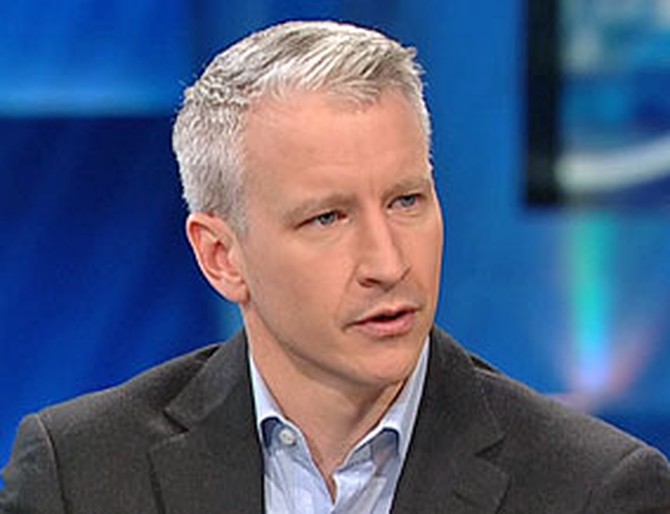
"We were on for seven hours live," Anderson says. "I've just never been on a story where it is all happening live in front of you and it just keeps going on."
As facts later came to light, Anderson says it became clear that mine officials were the only party to have known that the original reports were not true. "They're the ones who controlled access," he says. "They knew 45 minutes after the families started celebrating that something was not correct with the information. They got a conflicting report that, in fact, all the miners were dead at 12:30 a.m. and they chose for another two hours not to say anything to these mining families."
Anderson says that confusion reigned that night at Sago. Everyone thought the situation was exactly as it was originally reported, though, in fact, it was a "very bad mistake."
He says he does not believe it was caused by shoddy journalism. "The Governor gave the thumbs up," Anderson says. "The Congresswoman confirmed it. Every family member we talked to confirmed it. I've never been in a [situation] where you do all the right things and it's still wrong."
As facts later came to light, Anderson says it became clear that mine officials were the only party to have known that the original reports were not true. "They're the ones who controlled access," he says. "They knew 45 minutes after the families started celebrating that something was not correct with the information. They got a conflicting report that, in fact, all the miners were dead at 12:30 a.m. and they chose for another two hours not to say anything to these mining families."
Anderson says that confusion reigned that night at Sago. Everyone thought the situation was exactly as it was originally reported, though, in fact, it was a "very bad mistake."
He says he does not believe it was caused by shoddy journalism. "The Governor gave the thumbs up," Anderson says. "The Congresswoman confirmed it. Every family member we talked to confirmed it. I've never been in a [situation] where you do all the right things and it's still wrong."
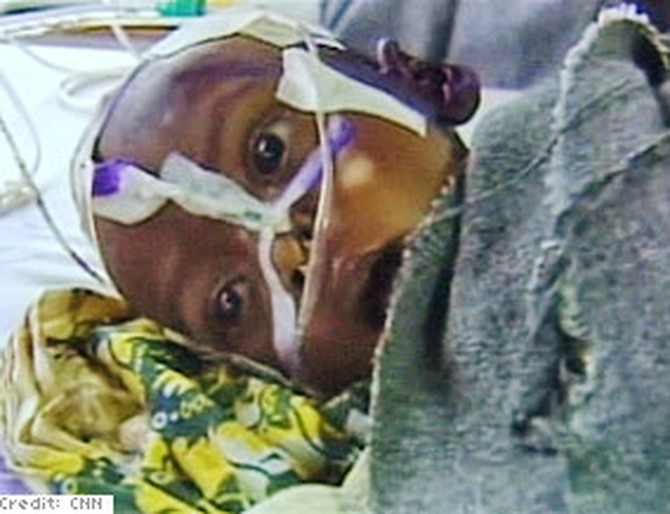
The Sago mine disaster was not the first powerful story Anderson has brought to life for viewers. He says his investigation on hunger in Africa is some of his most important work.
His reporting took him to a village in southern Niger during the "hungry season," when food is scarce even during a good year. In 2004 a drought led to a longer, more intense hungry season than normal. Famine was causing sickness and malnutrition across the region. Children in southern Niger were especially vulnerable.
"We've all seen the pictures of children with bloated bellies from malnutrition, infants with unfocused eyes," Anderson reported. "But still, when you're here and you see the children up close—you know that you're going to see them—but nothing prepares you for it. You never get used to seeing a child die."
The Nobel-Prize winning organization Doctors Without Borders is treating the children. Ten-month-old Habu's "tiny body [is] riddled with infections from months of severe malnutrition," says Anderson. Two-year-old Rashidu suffers from "water in his tissues." Little Aminu's edema is causing his skin to literally peel off.
His reporting took him to a village in southern Niger during the "hungry season," when food is scarce even during a good year. In 2004 a drought led to a longer, more intense hungry season than normal. Famine was causing sickness and malnutrition across the region. Children in southern Niger were especially vulnerable.
"We've all seen the pictures of children with bloated bellies from malnutrition, infants with unfocused eyes," Anderson reported. "But still, when you're here and you see the children up close—you know that you're going to see them—but nothing prepares you for it. You never get used to seeing a child die."
The Nobel-Prize winning organization Doctors Without Borders is treating the children. Ten-month-old Habu's "tiny body [is] riddled with infections from months of severe malnutrition," says Anderson. Two-year-old Rashidu suffers from "water in his tissues." Little Aminu's edema is causing his skin to literally peel off.
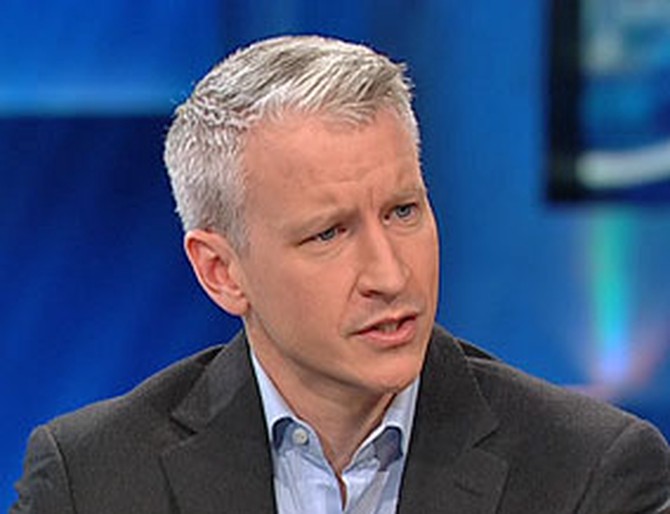
Anderson soon learned that things can change rapidly in drought-scarred Niger...and not usually for the better. Just hours after he first met them, Aminu still seemed to be doing okay, Rashidu was in septic shock and Habu had died.
"On the bed, Habu's cup and bowl are all that remain," Anderson reported. "His mother lives more than a hundred miles away and is already returning home. She left Habu behind, buried in an unmarked grave somewhere on the outskirts of town."
And, just hours later, Aminu—who seemed to be somewhat stable—also died.
The tragedy of this is that it's not even uncommon. "I talked to Aminu's grandmother, who has lost half of her grandchildren," Anderson says. "She can't even remember a lot of their names."
"On the bed, Habu's cup and bowl are all that remain," Anderson reported. "His mother lives more than a hundred miles away and is already returning home. She left Habu behind, buried in an unmarked grave somewhere on the outskirts of town."
And, just hours later, Aminu—who seemed to be somewhat stable—also died.
The tragedy of this is that it's not even uncommon. "I talked to Aminu's grandmother, who has lost half of her grandchildren," Anderson says. "She can't even remember a lot of their names."
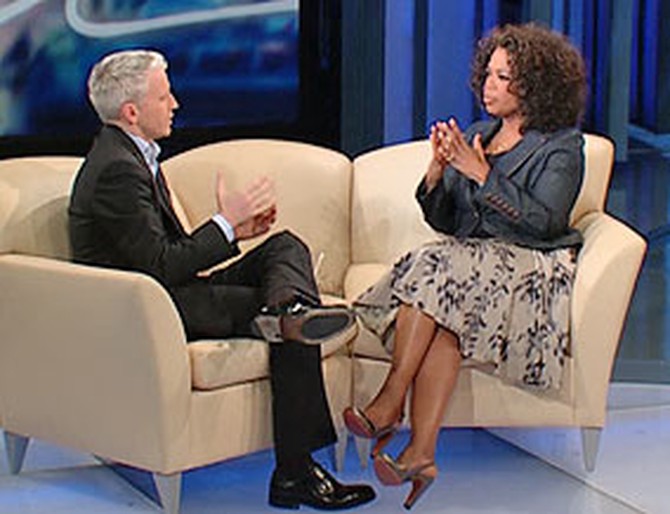
"When you've reported a lot of stories like this, there's a tendency to compare. 'Somalia was worse,' they say. So is the Sudan," Anderson says. "But there shouldn't be a sliding scale of sorrow. Children are dying. How many little lives lost is an acceptable toll?"
Anderson says that he had two goals in his Niger reporting. First, he wanted to bear witness to human suffering. "I want people to know about what's happening here," he says. "To me there's nothing sadder than a child or a family just dying on the side of the road and literally dissolving into the ground and no one even noticing their passing."
His other goal—to encourage action to end starvation in our lifetime. "It's possible," he says. "Starvation doesn't have to happen."
Anderson says that he had two goals in his Niger reporting. First, he wanted to bear witness to human suffering. "I want people to know about what's happening here," he says. "To me there's nothing sadder than a child or a family just dying on the side of the road and literally dissolving into the ground and no one even noticing their passing."
His other goal—to encourage action to end starvation in our lifetime. "It's possible," he says. "Starvation doesn't have to happen."
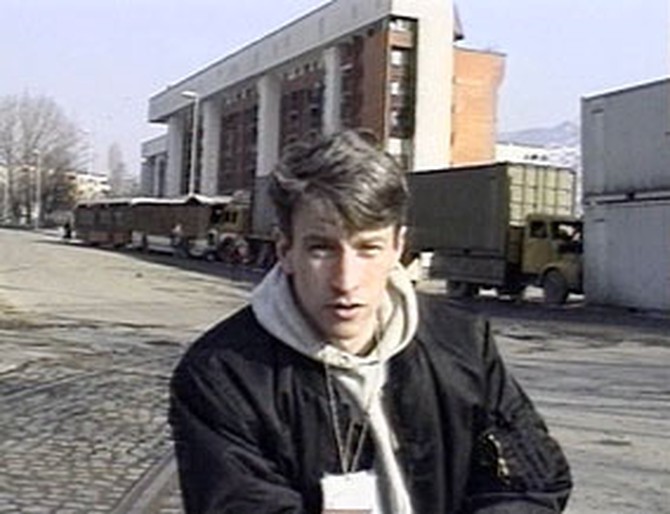
In one of his first assignments, a 23-year-old Anderson took a tripod and hit the war-torn streets of Sarajevo in the former Yugoslavia. After dodging sniper fire and sleeping on the floor to evade potential mortar attacks, Anderson proved his willingness to put his comfort and safety on the line to get the story.
Though he seemed cool under fire—literally—Anderson admits it wasn't quite as it looked. "I was setting the camera on a tripod because I used to travel by myself. I heard this crack go off in my ear and I'm like, 'Man, what is that? What was that?' Then I see this little puff of smoke on a column nearby and I realize someone has just taken a shot. I was like, 'Oh, my God. That was a bullet!"
Though he seemed cool under fire—literally—Anderson admits it wasn't quite as it looked. "I was setting the camera on a tripod because I used to travel by myself. I heard this crack go off in my ear and I'm like, 'Man, what is that? What was that?' Then I see this little puff of smoke on a column nearby and I realize someone has just taken a shot. I was like, 'Oh, my God. That was a bullet!"

From the Sago mine disaster to his reporting on hunger to his death-defying coverage in Sarajevo, Anderson has demonstrated his journalistic commitment.
"I think it's important for people to see what is happening in the world. All these things are happening, whether or not we're there, you know?" he says. "So it doesn't seem like that big a deal for me to go there and tell the story. I think it's the least we can do. These things are happening, but I think it makes it all the worse when people die and no one notices their passing."
"I think it's important for people to see what is happening in the world. All these things are happening, whether or not we're there, you know?" he says. "So it doesn't seem like that big a deal for me to go there and tell the story. I think it's the least we can do. These things are happening, but I think it makes it all the worse when people die and no one notices their passing."

Known for his in-your-face confrontations, ABC's chief investigative correspondent Brian Ross has demanded answers from con artists, fugitives and billionaires. On one memorable assignment, while exposing the crooks behind a charity scam, his fight for the truth got him punched in the face!
On assignment for 20/20, Brian uncovered one of the most horrific cases of child abuse our country has ever seen. He spoke with six children in foster care who say they were starved and locked up like animals for years. He was the first and only reporter they had ever talked to about their inhumane treatment.
On assignment for 20/20, Brian uncovered one of the most horrific cases of child abuse our country has ever seen. He spoke with six children in foster care who say they were starved and locked up like animals for years. He was the first and only reporter they had ever talked to about their inhumane treatment.

The police report made at the time the children were discovered describes nightmarishly inhumane and dangerous conditions. The children say for five years their foster mother, Jacqueline Lynch, locked them in a small barren room with one dog bowl of food and no toilet. In addition to regular beatings, the children say they endured sadistic torture at the hands of Lynch's teenage son. One brother remembers standing by helplessly as his siblings were taped into a large plastic crate and dumped into the swimming pool.
"I used to think I wished I was dead," says one child, "so I didn't have to be in this stupid place."
Brian says Lynch received $150,000 as the children's foster mother while caseworkers turned a blind eye to the abuse. Despite tips from teachers about possible mistreatment, official reports contained nothing but high praise for the Lynches. One file read, "Excellent foster parents. A secure, loving home." Finally, Brian says, a neighbor called a child abuse hotline and police responded. The six children were discovered huddled together in their room, emotionally battered and malnourished.
"I used to think I wished I was dead," says one child, "so I didn't have to be in this stupid place."
Brian says Lynch received $150,000 as the children's foster mother while caseworkers turned a blind eye to the abuse. Despite tips from teachers about possible mistreatment, official reports contained nothing but high praise for the Lynches. One file read, "Excellent foster parents. A secure, loving home." Finally, Brian says, a neighbor called a child abuse hotline and police responded. The six children were discovered huddled together in their room, emotionally battered and malnourished.

Jackie Lynch pled no contest to one misdemeanor count of child neglect, was put on one year's probation and ordered to pay $140 in court costs. Brian followed her trail to a small Alabama town and the confrontation was captured on tape in 2002. When Brian asked her about the children, Jackie said she had nothing to say. Her husband, Frank Lynch, was more vocal. "Don't take no damned pictures around here of me," he told Brian. "I'll break that [camera] in a heartbeat."
The children now live with loving, adoptive parents who say that watching this confrontation has been a major turning point in the siblings' lives. "You faced their demon. They thought the people didn't believe what had gone on. When you went on TV and you faced their previous parents, you made sure that they know now people do believe them."
Brian says this is one of the most important stories of his career. "I'm happy to say that the top official in Florida resigned three months after our story. There was some sense of justice for these children. ... I think that we [as journalists] have a job to go after the powerful and make sure that they are accountable for what they've done."
The children now live with loving, adoptive parents who say that watching this confrontation has been a major turning point in the siblings' lives. "You faced their demon. They thought the people didn't believe what had gone on. When you went on TV and you faced their previous parents, you made sure that they know now people do believe them."
Brian says this is one of the most important stories of his career. "I'm happy to say that the top official in Florida resigned three months after our story. There was some sense of justice for these children. ... I think that we [as journalists] have a job to go after the powerful and make sure that they are accountable for what they've done."
Published 01/31/2006

